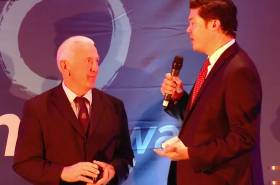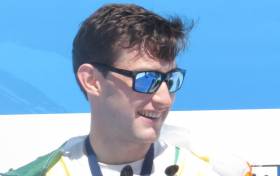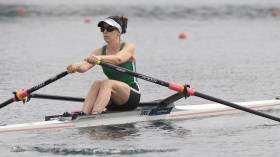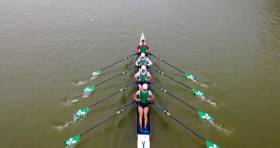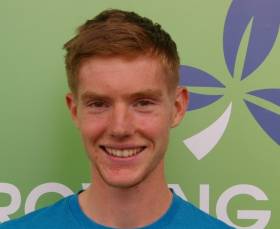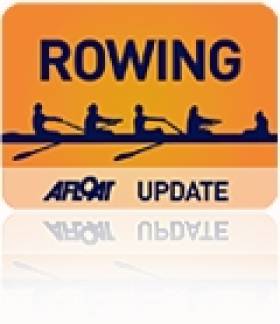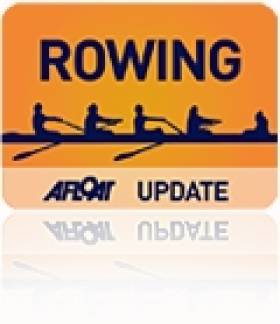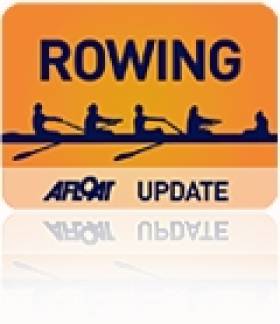Displaying items by tag: World Rowing
Dominic Casey is the World Rowing Coach of the Year
#Rowing: Dominic Casey has been chosen as the World Rowing Coach of the Year. The Skibbereen man, who coached Paul and Gary O’Donovan to a World Championship gold medal this year, received the award at a gala in Berlin. He had also been nominated in 2016 and 2017. In these years he oversaw the first Olympic medal for Ireland rowing, when the O’Donovan brothers took silver in Rio de Janeiro, and a string of gold medals for Mark O’Donovan and Shane O’Driscoll in the lightweight pair. In 2017, lightweight single sculler Denise Walsh also took silver in the European Championships and a World Cup silver.
Other awards on a glittering night went to the Australian men’s four, who were named the male crew of the year ahead of Paul and Gary O’Donovan, and the Poland quadruple, who took the women’s crew of the year, an award for which Sanita Puspure was nominated.
The 2018 World Rowing Para Crew of the Year is the Dutch PR2 mixed double of Annika van der Meer and Corne de Koning. The Sri Lankan oarsman and university student, Amidu Silva, won the 2018 Filippi Spirit Award.
The World Rowing Sustainability Award was taken by Alan Robinson and Schuylkill Navy for Love Where you Row.
The 2018 Distinguished Service to International Rowing award was won by Borge Kaas Andersen of Denmark.
Skibbereen Men Popular on Awards Circuit
#Rowing: The awards season is proving a fruitful one for rowers. Mark O’Donovan and Shane O’Driscoll were honoured at the Canon Hayes Centre awards and fellow Skibbereen man Paul O’Donovan has been nominated for the RTÉ Sportsperson of the Year award. All three won gold medals at the 2017 World Championships.
Ireland coach Dominic Casey was also nominated for the World Rowing Coach of the Year at the World Rowing Awards. Casey and Morten Espersen, the former Ireland high peformance director, were also nominated for Distinguished Service to International Rowing.
On the night, the France coach Alexis Besancon was chosen as Coach of the Year. John Boultbee of Australia won the Distinguished Service to International Rowing.
The Male Crew of the Year were the German eight, Female Crew of the Year was single sculler Jeannine Gmelin and World Para Crew of the Year went to Birgit Skarstein of Norway.
O'Donovan Adds Second Gold Medal for Ireland at World Rowing Championships
Walsh Continues Ireland's Winning Run in World Rowing Heats
#Rowing: Denise Walsh made it three wins out of three starts for Ireland at the World Rowing Championships in Florida today. The Ireland lightweight single sculler charged to the line to beat Kirsten McCann of South Africa in an exciting finish to their heat.
Earlier Paul O’Donovan, in the lightweight single and the lightweight pair of Shane O’Driscoll and Mark O’Donovan had also won.
World Rowing Championships, Sarasota-Bradenton, Florida – Day One – Irish Interest:
Men
Lightweight Pair – Heat One (First to A Final; rest to Repechage): 1 Ireland (M O’Donovan, S O’Driscoll) 6:33.20, 2 Britain (J Cassells, S Scrimgeour) 6:38.57, 3 Italy 6:40.39.
Lightweight Single Sculls – Heat Three (First Four to Quarter-Finals; rest to Repechages): 1 Ireland (P O’Donovan) 6:54.68, 2 Brazil 7:05.75, 3 Italy 7:09.88, 4 Thailand 7:17.50.
Women
Lightweight Single Sculls – Heat Three (First Three to A/B Semi-Finals; rest to Repechages): 1 Ireland (D Walsh) 7:43.87, 2 South Africa 7:44.38, 3 Italy 8:03.34.
#Rowing: The Ireland lightweight quadruple of Niall Beggan, Stephen O’Connor, Andrew Goff and Shane O’Connell qualified for the A Final at the World Under-23 Championships today by finishing third in their semi-final. Austria won the race in Plovdiv, Bulgaria in a new best time for the Championships. Ireland, who were down the field in the early stages, had a very strong middle of the race and coming up to the line they fought it out with Italy and Germany for the crucial second and third spots. Germany lost out, taking fourth.
The race was run in temperatures of over 30 degrees centigrade and good conditions – the best time was bettered immediately by the winners of the next semi-final, Switzerland.
World Rowing Under-23 Championships, Day Three (Irish interest)
Men
Lightweight Quadruple Sculls – Semi Finals (First Three to A Final; rest to B Final) – Semi-Final One: 1 Austria 5:47.86, 2 Italy 5:48.02, 3 Ireland (N Beggan, S O’Connor, A Goff, S O’Connell) 5:48.39; 4 Germany 5:49.57.
Semi-Final Two: 1 Switzerland 5:47.26, 2 Britain 5:49.31, 3 France 5:50.52.
#Rowing: Ireland’s lightweight quadruple won their heat at the World Rowing Under-23 Championships in Plovdiv in Bulgaria today. The crew of Niall Beggan, Stephen O’Connor, Andrew Goff and Shane O’Connell gave an outstanding performance. They outpaced early rivals Denmark, and when Britain challenged in the second half they more than matched them to win by 2.73 seconds. Britain and third-placed Spain qualified directly for the semi-finals.
David O’Malley and Shane Mulvaney finished second in their heat and must come through a repechage on Thursday to make the A Final of the lightweight men’s pair. The winner of each heat would qualify for the A Final. Ireland’s crew looked well in contention as they disputed the lead with Italy until 1,000 metres. But the Italy crew upped their rate and left Ireland behind. Their winning time was almost 12 seconds faster than the crew which won the second heat, Britain.
World Rowing Under-23 Championships, Plovdiv, Bulgaria (Irish interest)
Men
Lightweight Pair – Heat One (First to A Final; rest to Repechage): 1 Italy 6:41.77; 2 Ireland (S Mulvaney, D O’Malley) 6:47.52.
Lightweight Quadruple Sculls – Heat One (First Three to A/B Semi-Finals; rest to Repechage): 1 Ireland (N Beggan, S O’Connor, A Goff, S O’Connell) 5:59.39, 2 Britain 6:02.12, 3 Spain 6:03.16.
Lambe Misses Out By Single Second On A Final Chance
#WRChamps: Claire Lambe missed out by less than a second on a chance of competing in the A or B Finals at the World Rowing Championships in Chungju in Korea. The Dubliner needed to finish in the top two in the repechage, and contested second place with Australia’s Ella Flecker, but the Australian prevailed by .9 of a second. Patricia Obee of Canada finished ahead of both. Lambe must next compete in a C/D Semi-Final.
World Rowing Championships, Day Three (Irish interest)
Women
Lightweight Single Sculls – Repechage (First Two to A/B Semi-Finals; Rest to C/D Semi-Final): 1 Canada (P Obee) 7:38.35, 2 Australia (E Flecker) 7:42.73; 3 Ireland (C Lambe) 7:43.63, 4 Italy 7:47.10, 5 Korea 7:52.30, 6 India 8:25.62.
Limerick Hits Mark With Well-Run World Rowing Coaches Conference
# ROWING: The World Rowing Coaches Conference in Limerick over the weekend saw Irish delegates mix with the men and women who guided crews to glory at London 2012 in a well-run event. The presentation by Thomas Poulsen of Denmark was highly-praised, and there was a thought-provoking talk by German team psychologist Dr Annelen Collatz. Gearoid Towey spoke about the importance of managing the transition of athletes to life away from top-class sport and Martin McElroy also made a presentation.
The year of the Olympic Games is a good time to hold this event and delegates got a feel of being in the engine of world rowing as top coaches and mentors thrashed out proposed changes to rules which can be made early next year. A proposal to put the onus on each athlete to reach a set weight in a lightweight boat was controversial and discussed at length on Saturday evening.
The World Rowing Awards for 2012 were presented to the South Africa lightweight four (male crew of the year) and Britain’s women’s double sculls (female crew of the year). The coach of the year was Dick Tonks of New Zealand and single sculler Huang Cheng of China took the award for adaptive crew of the year. Di Ellis was given the award for distinguished service to rowing.
At the conclusion of the business side of the event, John Boultby, the chairman of Fisa’s competitive rowing committee, said the logistical organisation in Limerick had been “superb”.
O'Donovan Matches Nixon With Win at Dorney Lake
Paul O’Donovan matched the feat of compatriot Holly Nixon when he won his heat of the single scull at the World Rowing Junior Championships at Dorney Lake in England this morning. The Skibbereen man took over the lead coming up to the 1750 metre mark and won from Latvia, Belarus and Tunisia. All four will compete in tomorrow’s quarter-finals.
World Rowing Junior Championships, Dorney Lake, Britain (Irish interest)
Men
Junior Single Scull - Heat Three (First Four Directly to Quarter-Finals): 1 Ireland (P O’Donovan) 7:55.25, 2 Latvia 7:59.08, 3 Belarus 7:59.81, 4 Tunisia 8:03.74; 5 Georgia 8:41.14.
Women
Junior Single Scull – Heat Two (First Two Directly to A/B Semi-Finals; rest to Repechage): 1 Ireland (H Nixon) 8:45.23, 2 Switzerland (J Jeannet) 8:55.51; 3 Belgium 9:04.72, 4 Slovenia 9:04.80, 5 Venezeula 10:06.41.



























